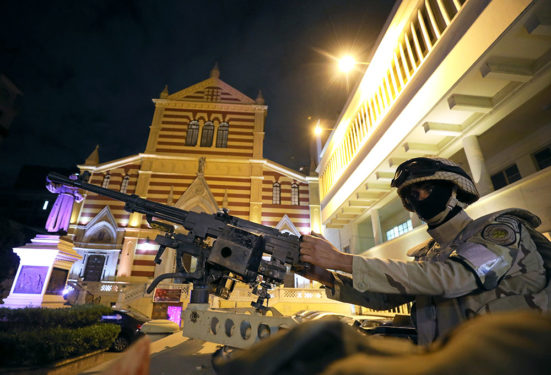By Engy Magdy, Special to The Tablet

Coptic Christians in Egypt celebrated Christmas Jan. 7 – breaking their 43-day vegetarian fast, a religious practice in which Christians refrain from all dairy products and meat during the Advent season.
Orthodox Christians around the world, mainly in Egypt and Russia, celebrate the birth of Jesus Christ nearly two weeks after their Christian brothers and sisters in other parts of the world held their festivities Dec. 25. The difference in dates is not due to a theological dispute, but rather, a chronological one.
Chronological, Not Theological
The change can be traced back to 1582 when the Roman Catholic and Eastern Orthodox churches started to use different calendars. While Western churches began following the Gregorian calendar, Orthodox churches continued to follow the older Julian calendar, which is in line with the ancient Coptic calendar.
The actual date of Jesus’ birth is unknown. However, in the beginning of fourth century, the Church all over the world agreed to celebrate the Nativity of Jesus Christ on Dec. 25, in accordance with the Julian calendar, introduced by Julius Caesar in 46 B.C.
This coincides with 29 Kiahk in the Coptic calendar. The date occurs just after the winter solstice, marking the beginning of more daylight, a fitting time to celebrate the birth of Christ, who is the Light of the World.
Then in the 16th century, scientists working under Roman Pope Gregory XIII noticed an 11-minute mistake in the calculation of the length of the Greek solar year, which was believed to span 365 days and six hours.
To correct this, Pope Gregory XIII recalculated the whole system and introduced his Gregorian calendar, which states that the year lasts for 365 days, five hours, 48 minutes and 46 seconds – approximately 11 minutes and 14 seconds shorter than the Julian calendar.
As a result, the Julian calendar is now 13 days behind the Gregorian calendar. Thus, Dec. 25 (29 Kiahk) in the Julian system falls on Jan. 7 in the Gregorian system.
New Cathedral
Copts celebrated Christmas Eve this year with Mass in the new Cathedral of the Nativity – the largest in the Middle East – which Egyptian President Abdel Fattah El-Sisi inaugurated Jan. 6.
The new Coptic Cathedral, which can accommodate more than 8,000 worshippers, is located in Egypt’s New Administrative Capital (NAC) – a new city that is located 45 kilometres, or about 27 miles, east of Cairo – which will house government buildings and a new airport.
Terror Targets
Copts, who account for some 10 percent of Egypt’s 100 million people, celebrated Christmas this year amid tight security around Christian places of worship and Church-linked facilities all over Egypt, as terrorists usually target Christians in such seasons. In recent years, the Islamic State militants have heavily targeted Christians.
Groups affiliated to ISIS signaled their intent to wage war by slaughtering Christians in their homes, businesses and places of worship.
In Al-Arish, the capital of the North Sinai Governorate, which is northeast of Cairo, dozens of families fled in droves after militants affiliated with the Islamic State massacred seven Christian people in a series of attacks in February 2016.
El-Sisi’s government is waging a relentless war against terrorists in Egypt. Since he became president in 2014, El-Sisi called repeatedly for renewing the religious discourse and spreading tolerance in the Egyptian society.
A lot of Egyptians, including Pope Tawadros II of Alexandria, patriarch of the Coptic Orthodox Church, praised El-Sisi’s decision to open the new cathedral as a step toward modeling tolerance and peaceful coexistence from the top levels of society.
Licensing Concerns Continue
However, churches in Egypt continue to face concerns over licensing, despite a law to regulate the construction of churches passed on Sept. 28, 2016. There is a big gap between what El-Sisi says and what happens on the ground, especially in Upper Egypt, and more specifically in the Al Minya Governorate, which is described as the stronghold of Muslim hardliners.
Most troubles for Christians happen in this part of Egypt. In the past year alone, more than five attacks by Muslim extremists targeted Christian churches and homes.
